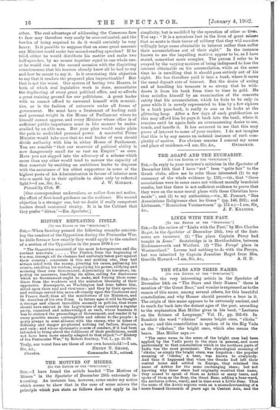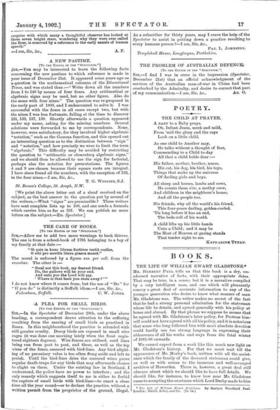THE STARS AND THEIR NAMES.
[TO THE EDITOR OP THE " SPECTATOR"]
SIR,—In the very interesting article in the Spectator of December 14th on " The Stars and their Names" there is mention of "the Great Bear," and wonder is expressed as to the reason of this name, among several others, for this beautiful constellation, and why Homer should perceive a bear in it.
The origin of this name appears to be extremely ancient, and to reach far back into the distant ages of the past, according to the explanation Max Muller gives in his book, " Lectures on the Science of Language," Vol. II., pp. 361-64. In Sanskrit the word " rikshas " means bright ones, " riksha" a bear ; and this constellation is spoken of in the Rig Veda as the " rikshas," the bright ones, which also means the bears Max Muller says :—
" The same name in the sense of the bright ones had been applied by the Vedic poets to the stars in general, and more particularly to that constellation which in the northern parts of India was the most prominent. The etymological meaning of • rikaha,' as simply the bright stars, was forgotten : the popular meaning of riksha,' a bear, was known to every body. And thus it happened that when the Greeks had left their central home and settled in Europe, they retained the name of Arktoa for the same unchanging stars ; but not knowing why these stars had originally received that name, they ceased to speak of them as Arktoi or many bears, and spoke of them as the Bear, the Great Bear, adding a bear-ward, the Arcturus (oilros, ward), and in time even a Little Bear. Thus the name of the Arctic regions rests on a misunderstanding of a name framed thousands of years ago in Central Asia, and the surprise with which many a thoughtful observer has looked at these seven bright stars, wondering why they were ever called the Bear, is removed by a reference to the early annals of human speech."







































 Previous page
Previous page